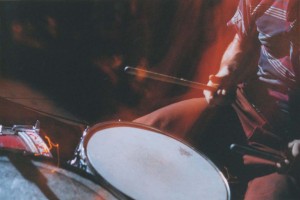Being that we have a few music aficionados (and some practitioners, at that) on staff at the Libraries, we note that we’re once again amid the academic calendar timeout when the students take a (mostly) well-deserved break from classes and the city becomes a mobility nightmare as vectors from the tech, film and music industries converge on Austin to engage in a gathering of equal parts profile building and navel gazing.
South by Southwest is the place where The Next Big Thing is likely to happen, be it the social media juggernaut of the future (Twitter, SX2007), an Academy Award winner (The Hurt Locker, SX2009) or a game-changing musical act (White Stripes, SX2001).
It’s no easy task to break through, though — be it at an annual conference like SXSW, or just as a matter of standing out in a world where technology has been significantly democratized creating a flood of entertainment options. And refining your craft is somewhat easier when your passion is also your job; the tech sector tends to breed its own winners, and industry experience is almost a prerequisite for succeeding in Hollywood. That fact makes being a pure artist an almost Sisyphean undertaking in the modern world.
More often than not, people with creative dispositions need to find jobs among the ranks of the blue and pink collar working set in order to provide income to support themselves through early (or even permanent) periods of anonymity. In New York, fledgling thespians eye Broadway from behind the mirrored windows of cafes as baristas or bartenders. The young and attractive who trek west with eyes on Hollywood make ends meet working as waitstaff in LA’s swankiest hotspots, hoping to cross paths with an industry bigshot. And many visual artists bide their time in production jobs on Grand Avenue in Chicago waiting for their first big gallery show or positive review to launch their career.
So how do musicians who live in the “Live Music Capital of the World” sustain themselves while they hone their art and build an audience? At least one place you might find a featured act in a new music showcase or subject of a glowing Pitchfork review are among the staff in the libraries on the UT campus.
The Libraries have harbored a substantial lineage of musically-inclined talent among the ranks of its past and present staff, mostly in support positions that provide the heavy lifting — both literally and figuratively — of library work. Beloved Austin singer Marcia Ball worked as a clerk at the Collections Deposit Library on the edge of campus in the early 70s. Before he was placing his stamp on the scene with fellow True Believer Jon Dee Graham, Alejandro Escovedo was checking out books at the Perry-Castañeda Library circulation desk. And there’s a virtual catalog of other personalities from Austin’s music scene — both known and supposed — that have some connection to the libraries on the Forty Acres.

How an academic library became a magnet for creatives in Austin makes sense. As the city has grown in fits and starts, much of the wage-earning job opportunities have been in the retail and food service spaces that serve the university community and cater to the student demographic. Likewise, many of the low cost residential rentals have historically been clustered in north and west campus neighborhoods where it provided easy access to campus denizens who didn’t have access to vehicles, or artists who needed to be close to the arts and entertainment venues that afford the best opportunities for exposure. A university community tends to feed the intellectual curiosity of its host city’s population, and those with natural tendencies toward cerebral pursuits, in turn, gravitate to the campus.
Add in an ever-escalating cost of living — especially those costs associated with healthcare — and a university job with its relative security and benefits becomes a much more attractive prospect for an artist who needs income to support their creative habits than most of the other wage-based options available.
Then again, some folks just wind up here because they love the books, or the people, or the place.
Several past and current staffers who also happen to be musicians have offered perspectives on why they landed work at the library, and how that connection impacted their music. Continue reading A Hidden Musicians’ History of the UT Libraries

